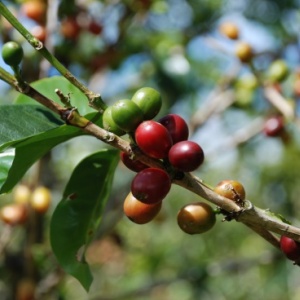
Coffee is the most widely traded agricultural commodity of the tropics, and studies have shown that as a crop it is very sensitive to rising temperatures arising from, climate change. Two new studies now look at the implications of warmer temperatures on Arabica coffee production.
The first study, Coffea arabica yields decline in Tanzania due to climate change: Global implications, warns that rising temperatures pose serious threat to the global coffee market, potentially affecting the livelihoods of small farmers and pushing up prices. Researchers working with the CGIAR Research Program on Climate Change, Agriculture and Food Security (CCAFS) provide evidence that climate change is already impacting the arabica coffee sector in the East African Highlands region. Over the last 49 years, there has been a +1.42 °C increase in night temperatures which has led to yield decreases in Arabica of 195 kg/ha.
Abstract
Coffee is the world’s most valuable tropical export crop. Recent studies predict severe climate change impacts on Coffea arabica (C. arabica) production. However, quantitative production figures are necessary to provide coffee stakeholders and policy makers with evidence to justify immediate action. Using data from the northern Tanzanian highlands, we demonstrate for the first time that increasing night time (Tmin) temperature is the most significant climatic variable responsible for diminishing C. arabica yields between 1961 and 2012. Projecting this forward, every 1 °C rise in Tmin will result in annual yield losses of 137 ± 16.87 kg ha−1 (P = 1.80e-10). According to our ARIMA model, average coffee production will drop to 145 ± 41 kg ha−1 (P = 8.45e-09) by 2060. Consequently, without adequate adaptation strategies and/or substantial external inputs, coffee production will be severely reduced in the Tanzanian highlands in the near future. Attention should also be drawn to the arabica growing regions of Brazil, Colombia, Costa Rica, Ethiopia and Kenya, as substantiated time series evidence shows these areas have followed strikingly similar minimum temperature trends. This is the first study on coffee, globally, providing essential time series evidence that climate change has already had a negative impact on C. arabica yields.
Citation
Craparo, C.W., Van Asten, P.J.A., Läderach, P., Jassogne, L.T.P., Grab, S.W., (2015) Coffea arabica yields decline in Tanzania due to climate change: Global implications, Agricultural and Forest Meteorology, doi:10.1016/j.agrformet.2015.03.005
Read the full paper here.
The second paper, Projected Shifts in Coffea arabica Suitability among Major Global Producing Regions Due to Climate Change, considers how the cultivation of coffee might have to change in order to cope with the effects of climate change. The researchers, from the International Center for Tropical Agriculture (CIAT), argue that intercropping coffee with trees to provide shade, or moving to higher elevations where it is cooler, can compensate for higher temperatures by two to three degrees. The paper concludes that coffee will need to move between 300 to 500 meters further above sea level, depending on location, to survive.
Abstract
Regional studies have shown that climate change will affect climatic suitability for Arabica coffee (Coffea arabica) within current regions of production. Increases in temperature and changes in precipitation patterns will decrease yield, reduce quality and increase pest and disease pressure. This is the first global study on the impact of climate change on suitability to grow Arabica coffee. We modeled the global distribution of Arabica coffee under changes in climatic suitability by 2050s as projected by 21 global circulation models. The results suggest decreased areas suitable for Arabica coffee in Mesoamerica at lower altitudes. In South America close to the equator higher elevations could benefit, but higher latitudes lose suitability. Coffee regions in Ethiopia and Kenya are projected to become more suitable but those in India and Vietnam to become less suitable. Globally, we predict decreases in climatic suitability at lower altitudes and high latitudes, which may shift production among the major regions that produce Arabica coffee.
Citation
Ovalle-Rivera O, Läderach P, Bunn C, Obersteiner M, Schroth G (2015). Projected Shifts in Coffea arabica Suitability among Major Global Producing Regions Due to Climate Change. PLoS ONE 10(4): e0124155. doi:10.1371/journal.pone.0124155, DOI: 10.1371/journal.pone.0124155
Read the full paper here.
Read more on CCAFS website here. You can also find an interesting article in the Guardian here which covers these studies.
For more information on coffee production and climate change, see our research library here.







Post a new comment »